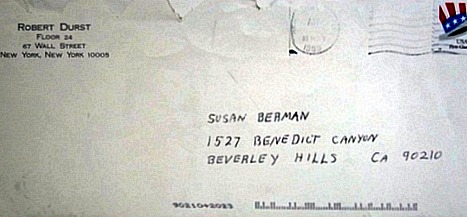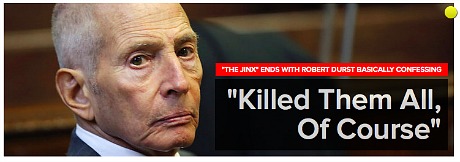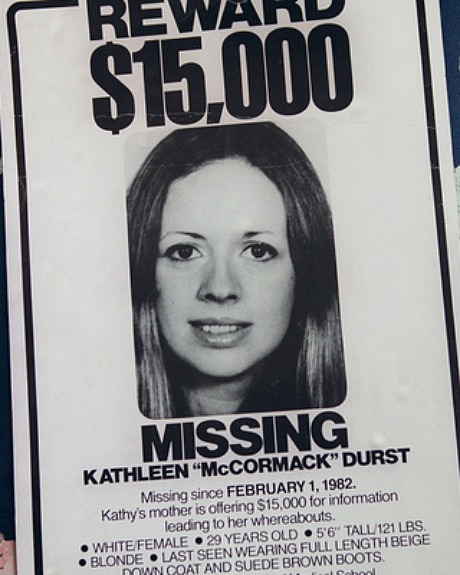Update: I haven’t seen the sixth and final episode of Andrew Jarecki‘s The Jinx: The Life and Deaths of Robert Durst (it won’t air until 8:00 pm Pacific) but a Deadline report states that during the episode Durst “is heard on tape admitting he ‘killed ‘em all, of course'” — an apparent reference to his long-missing wife Kathie Durst, who disappeared in 1982, as well as Durst’s longtime friend and ally Susan Berman who was found shot to death in December 2000, in addition to Morris Black, whom Durst admitting killing in a Galveston murder trial. Variety‘s Brian Lowry reports that Durst “appears to confess while talking to himself, [speaking] into an open microphone while in the bathroom, after having been confronted with damaging evidence. ‘There it is…you’re caught,’ he mutters a bit later. ‘What a disaster.'”

New York real-estate heir Robert Durst, long suspected of the murder of his late wife, Kathie Durst, in 1982 and now being actively prosecuted by Los Angeles authorities for the 2000 murder of Susan Berman, who was found shot in her Benedict Canyon home.

Anonymously sent letter to “Beverley” Hills PD, postmarked 12/23/00 or the day California officials believe that the shooting of Susan Berman occurred.

1999 letter written to Susan Berman by longtime friend Robert Durst.

Art posted by Buzzfeed.
Posted earlier: If you’ve seen the five aired episodes of Andrew Jarecki‘s The Jinx: The Life and Deaths of Robert Durst, as I have, wild horses couldn’t keep you from watching tonight’s finale. Partly because the series has been quite riveting but mainly because it became apparent during last Sunday’s episode that Jarecki had obtained conclusive proof that Durst, the wealthy 71 year-old son of the late New York real estate mogul Seymour Durst and long suspected of the 1982 murder of his wife Kathie, is the author of an anonymous cryptic note sent to the Beverly Hills police department on 12.23.00, alerting them to the presence of a “CADAVER” at the Benedict Canyon home of the late Susan Berman, a friend of Durst’s who was probably killed the same day.
The “whoa!” element is not that the word Beverly was mis-spelled “BEVERLEY” on the 12.23.00 envelope, but that the same mis-spelling appears on a letter Durst sent to Berman in 1999.
Last night Durst was arrested in New Orleans on a warrant charging him with Berman’s murder. Berman, a journalist/author and the daughter of a mafioso, became Durst’s close friend in the ’70s, and served as his unofficial spokeswoman in the wake of Kathie’s disappearance. It has long been assumed that Berman knew something about the the late Mrs. Durst’s absence. The case was re-opened in 2000, and Berman was killed soon after it was announced that the Manhattan district attorney’s office was intending to re-interview her about the Kathie Durst case. Durst has admitted to being in northern California at the time, although he’s claimed he had no time to drive all the way down to Los Angeles during the time period in question.
Here’s a 3.9.15 N.Y. Times report by Charles V. Bagli about the reopening of Berman case by Los Angeles authorities.
In his interview with Jareck in The Jinx and in earlier testimony and interviews, Durst has denied involvement in Berman’s death and his wife’s disappearance.
Obviously Los Angeles authorities ordered Durst’s arrest, which happened around 11 p.m. last night, because of the spelling-match-on-the-two-envelopes evidence revealed in last week’s episode of The Jinx. The murder happened over 14 years ago and they hadn’t been persuaded that they had a case against Durst all that time. Do the math.
The writing on the two envelopes, while damning, is not conclusive proof that Dust shot Berman. But it seems awfully close to conclusive.
I was hooked by The Jinx after catching a special screening of the first two episodes during last January’s Sundance Film Festival. Since then I’ve watched each episode on HBO at least twice and in some instance thrice. It’s that good, that gripping, that fascinating.
Durst, an Asperger’s syndrome sufferer, seems creepy with his chilly manner and spazzy eyelid blinkings but he doesn’t exude the conventional aura of a guy who’s “hiding something”, or at least not someone who’s anxious or guarded about what he might say and therefore oblique or circumspect about everything. Durst might well be the biggest liar of our times, but there’s something strangely compelling in that flat, deep, heavily fatigued voice of his and the cynical way he talks about the particulars. He doesn’t seem guilty as much as tired of himself in the Dylan sense of that term and just tired of the whole ordeal of being a murder suspect.
At times during his discussions with Jarecki on the show Durst almost seems ready to say that yes, okay, fine, he killed his ex-wife and then yes, okay, Susan Berman also to keep her from talking about what happened with Kathie because he just can’t stand talking about it any longer and that his soul has been so polluted and poisoned by his actions and the investigations that have followed that he just wants clarity and finality, even if it means spending the rest of his life in jail.
I’m not saying that Durst shot Berman, but what kind of mentally challenged murderer writes a letter to the cops informing them that the body of the person he’s killed can be found at a certain address? I’ll tell you what kind of murderer does this. A murderer who feels (or has felt) a certain affection or compassion for the victim when she was alive, and who doesn’t want her body to rot for days and days. A murderer, in short, who feels compelled to show respect for the victim by preventing her dead body from suffering the usual post-mortem decomposition.
Jarecki directed All Good Things, a 2010 feature based on the Kathie Durst disappearance that costarred Ryan Gosling, Kirsten Dunst and Frank Langella.
Kathie Durst’s disappearance has long been relegated to a missing-person status, although there’s never been any evidence that she’s alive. Robert Durst told the cops that he and his wife left their South Salem home on the night of 1.31.82, and that he drove her to the Katonah train station where she boarded a train to Manhattan. He also claimed he spoke to Kathie later that night by phone. He reported her missing three or four days later.
New York state police Investigator Joseph Becerra was reportedly the first to take a fresh look at Kathie’s disappearance in 2000. This NBC Dateline report reviews some of the basics:
Visit NBCNews.com for breaking news, world news, and news about the economy










